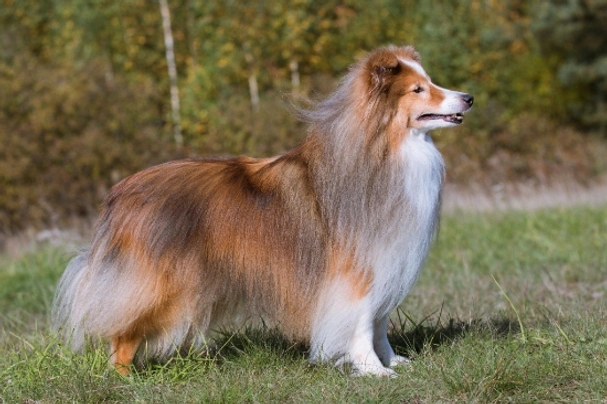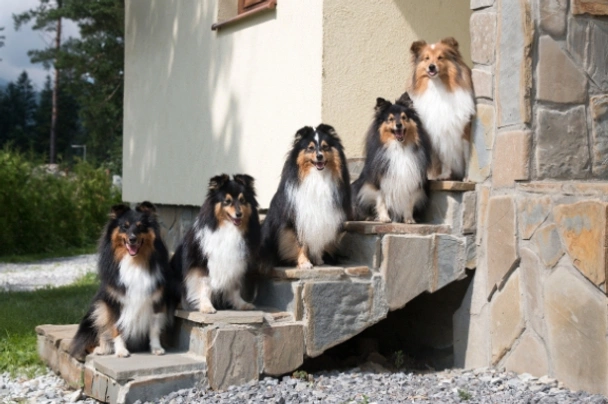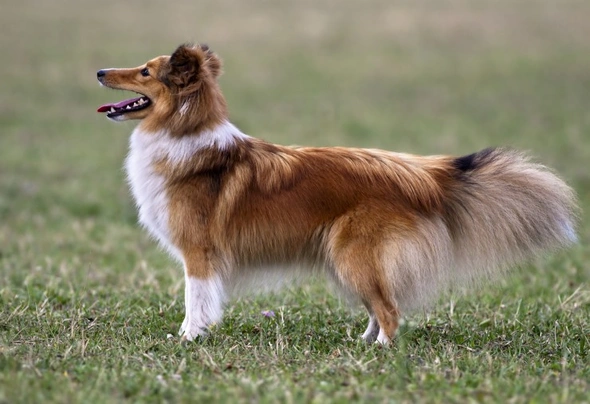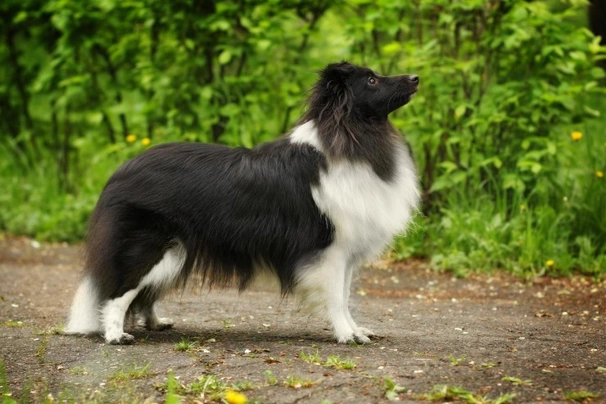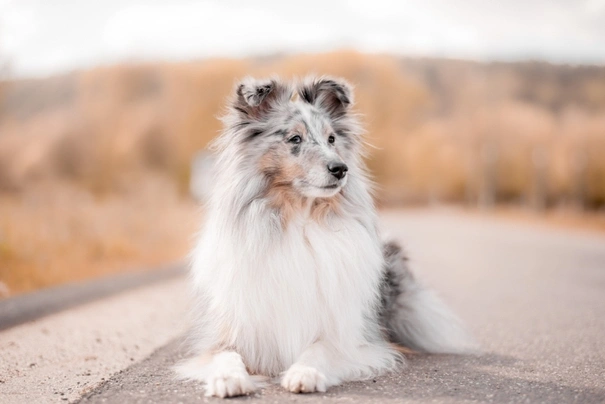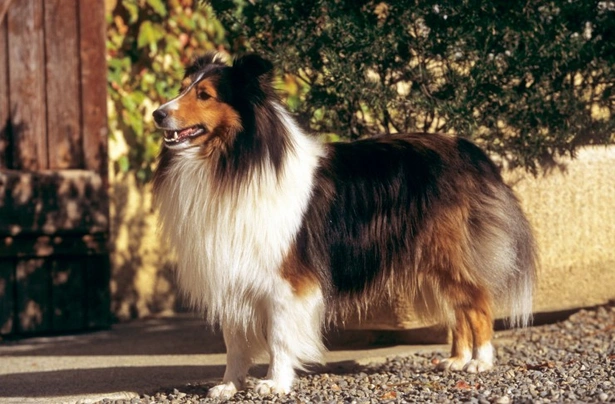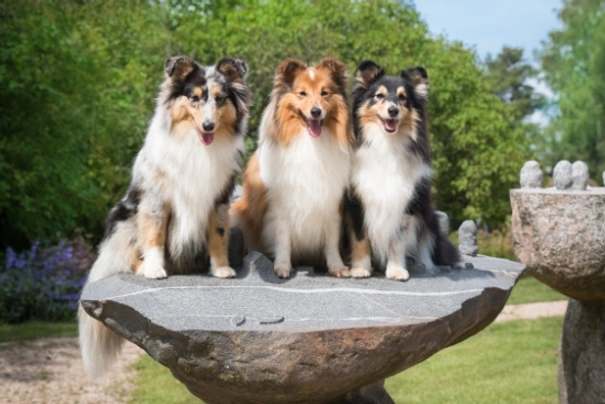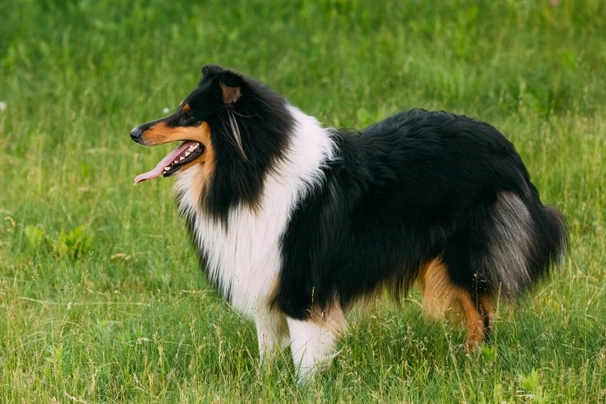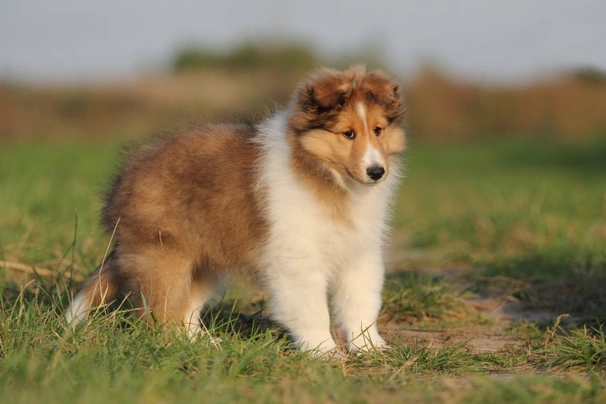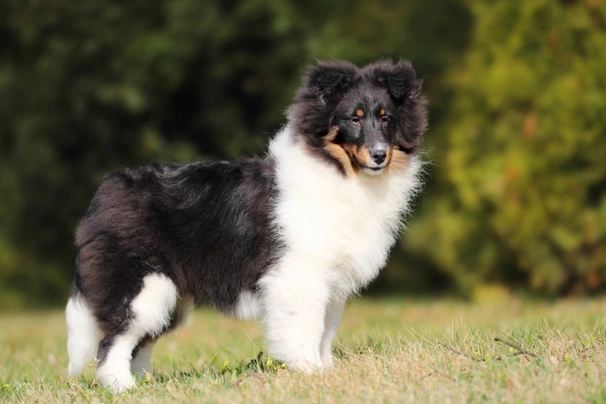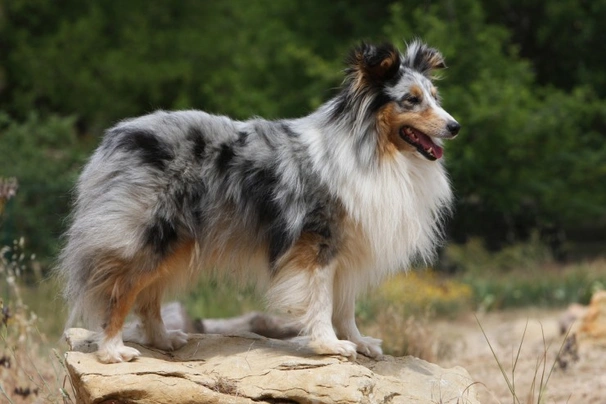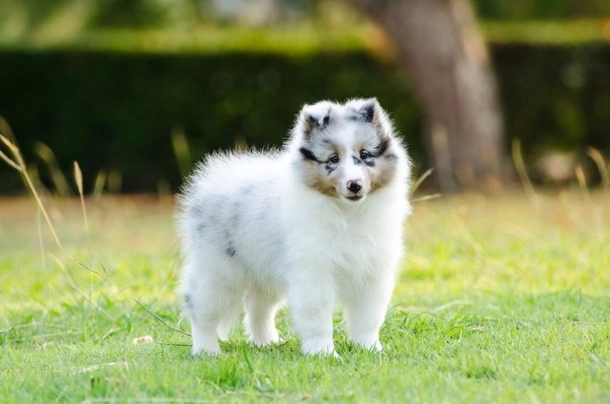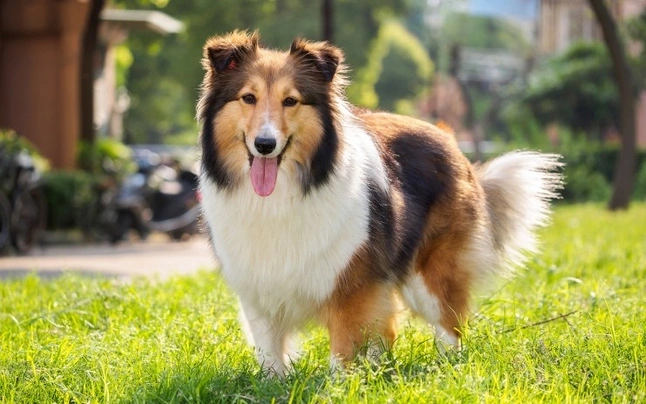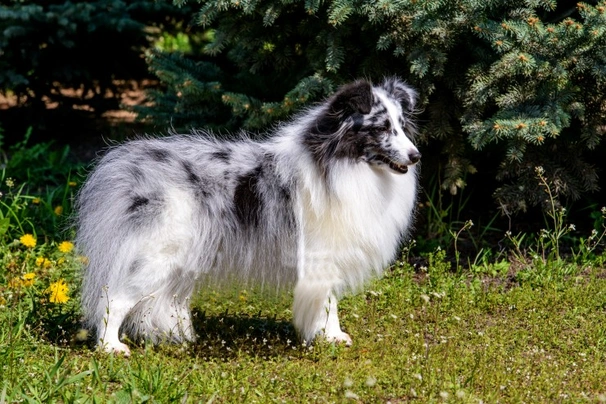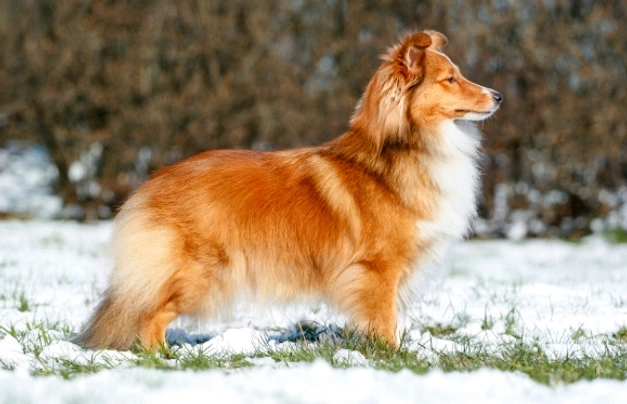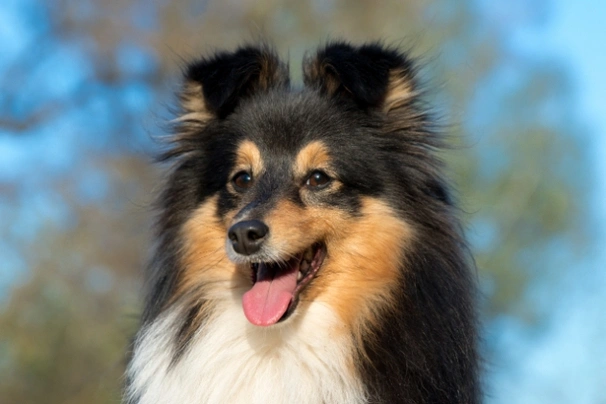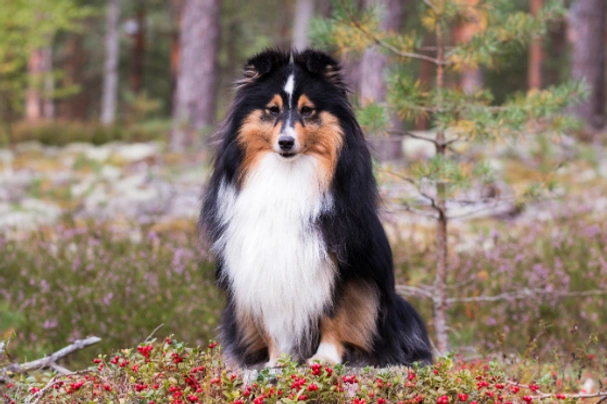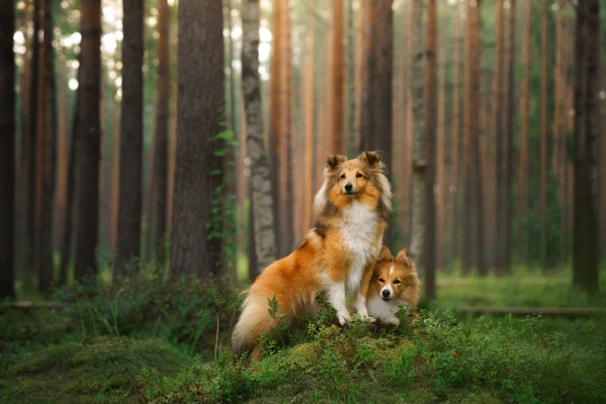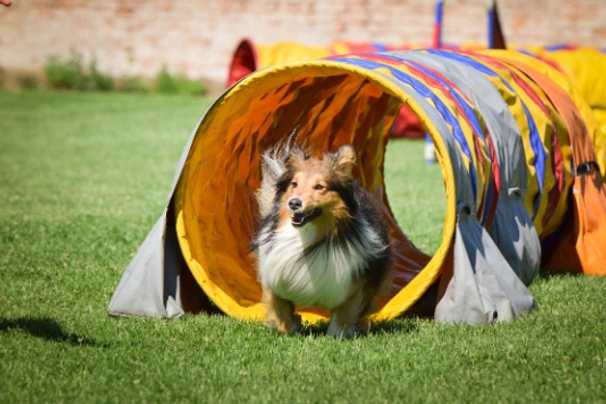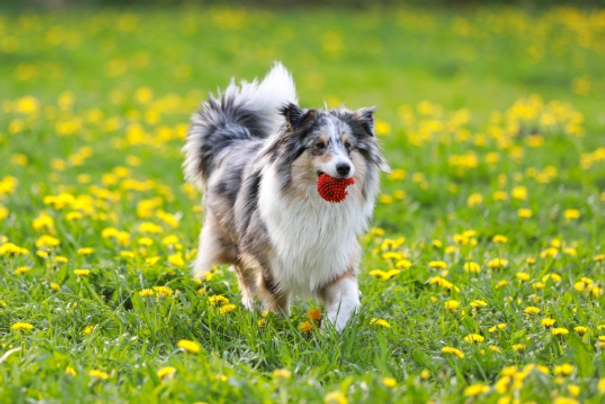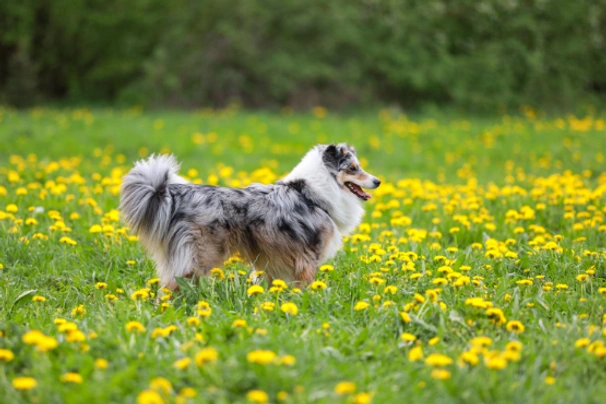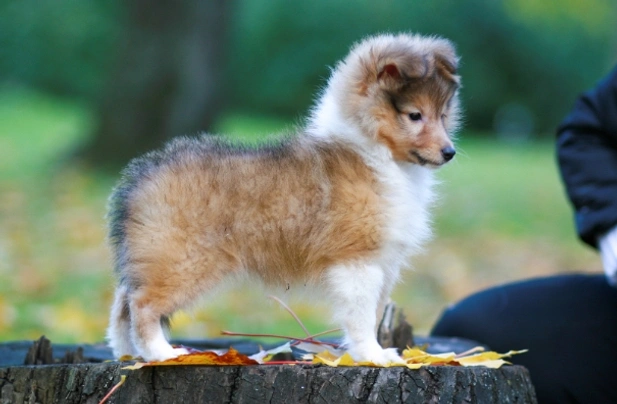Pets
Pets for studWanted petsBreedersAccessories & services
Knowledge hub
Support
Support & safety portalShetland Sheepdog
Pros
Cons
Introduction of the Shetland Sheepdog
The Shetland Sheepdog looks very much like a smaller version of a Rough Haired Collie and has the same luxuriously thick double coat. Over the years these charming small dogs have found their way into the hearts and homes of many people both here in the UK and elsewhere in the world thanks to their delightful and loyal natures. Shelties are also very popular whenever they are exhibited in the show-ring both with judges and spectators thanks to their glorious coats and charming looks.
The breed was given their name of the Shetland Islands where they were first bred although it is worth noting that Shelties are also native to Orkney too. They are renowned for being wonderful companions and family pets although better suited to household with older children rather than toddlers. It is also worth noting that the Shetland Sheepdog sheds copiously throughout the year only more so during the spring and the autumn.
History of the Shetland Sheepdog
The Shetland Sheepdog was developed in the Scottish islands that are situated off the northeast coast both on Shetland and Orkney. These small dogs were used to herd livestock on the islands which tended to be that much smaller than that on the mainland. As such diminutive herding dogs fitted the bill perfectly hence the Shetland Sheepdog was developed. As such the breed is more than likely a "generic" version of the collie and a dog that was popular with crofters throughout the islands. Similar dogs were reported to have existed as far back as 1844 being referred to as Lilliputian Collies the Toonie Dog Peerie Dog Miniature Collies and Fairy Dogs.
There is an engraving of a Sheltie that dates back to 1840 in Lerwick where a "Shetland Collie Club" was founded in 1908 with an end goal being to keep the breed true to type. and a year later in 1909 the Scottish Shetland Sheepdog Club was formed. The same year the Kennel Club turned down a request to give the breed full recognition which led to the breed club producing a stud book with an end goal being to standardise the breed.
In 1914 the Kennel Club finally recognised Shetland Sheepdogs are a breed but refused to call them Shetland Collies. As such the breed was officially named "Shetland Sheepdogs". Today the Shetland Sheepdog remains a popular choice both as a family pet and companion dog throughout the world thanks to their charming looks their small stature and their loyal affection natures.
Interesting facts about the breed
- Is the Shetland Sheepdog a vulnerable breed? No they have remained a popular breed in the UK throughout time
- They were once known as Shetland Collies as well as Lilliputian Collies the Toonie Dog Peerie Dog Miniature Collies and Fairy Dogs
- They are highly intelligent but stubborn at times
- Shelties are extremely good at obedience
- They move animals along by nipping at their heels
- Although herding dogs Shetland Sheepdogs did not “herd” flocks they kept sheep away from areas they were not allowed to go
- Shetland Sheepdogs were first recognised by the Kennel Club in 1909 but were only recognised as a separate breed to the Collie in 1914
- A Sheltie’s coat should never be brushed when wet to avoid breaking each hair
Appearance of the Shetland Sheepdog
Height at the withers: Males 33.0 - 44.6 cm Females 33 - 44.6 cm at the withers
Average weight: Males 6.4 - 12.3 kg Females 6.4 - 12.3 kg
The Shetland Sheepdog resembles a Rough Coated Collie only in miniature. They have a very refined elegant head which tapers nicely to the nose. Their heads are flat between a dog's ears and there's no obvious occipital bone although there is a definite albeit not too obvious stop. Their noses lips and eye rims are black with dogs having a kind alert and intelligent look about them. Eyes are moderate in size and set obliquely being round and a nice dark brown in colour apart from merle dogs where one or both of their eyes can be flecked with blue or a solid blue colour.
Their ears are small and set moderately wide apart with dogs carrying them back when relaxed but forward when excited or alert with the very tips falling forwards. The Shetland Sheepdog has a strong jaw with a perfect scissor bite where their upper teeth neatly overlap their lower ones. Their necks are nicely arched muscular and sufficiently long so it allows a dog a proud head carriage.
Shoulders are nicely laid back and ribs well sprung with dogs having nice straight and well-muscled front legs. Their chests are deep reaching down to the point of a dog's elbows and their backs are level gently sweeping over their loins. Croups slope gently to a dog's backend adding to their graceful appearance.
Hindquarters are strong with dogs having strong well-muscled back legs and nicely padded oval feet with well arched tight toes. Their tails are set low and taper to the tip with a profuse amount of hair growing its full length. Dogs carry their tails slightly raised when excited but they never carry them any higher or over their backs.
When it comes to their coat the Shetland Sheepdog has a thick dense coat that consists of a harsher straight top coat and a much softer short undercoat. The hair around a dog's neck is longer and more profuse forming a mane and their front legs are nicely feathered. Back legs have an abundance of hair above the hocks but it's smoother on their lower back legs. The accepted breed colours for Kennel Club registration are as follows:
- Black & Tan
- Black & White
- Blue Merle
- Merle
- Sable
- Sable & White
- Shaded Sable
- Shaded Sable & White
- Tricolour
Gait/movement
When a Shetland Sheepdog moves they do so with a graceful smooth and lithe movement showing a lot of drive from behind and covering a lot of ground when they do with very little effort.
Faults
The Kennel Club frowns on any exaggerations or departures from the breed standard and would judge the faults on how much they affect a dog's overall health and wellbeing as well as their ability to perform.
Males should have both testicles fully descended into their scrotums and it is worth noting that a dog can be a little lighter or heavier as well as slightly taller or shorter than set out in the Kennel Club breed standard which is given as a guideline only.
Temperament of the Shetland Sheepdog
The Shetland Sheepdog is an energetic highly intelligent dog and one that boasts having a bit of a glamorous look about them. They are busy dogs and like nothing more than to be out and about with an owner. They form very strong bonds with their families and once this bond is formed it is often unbreakable. However they can be a little wary and aloof around strangers although rarely would a Sheltie show any sort of aggression to anyone they did not already know preferring to just keep their distance until they got to know them.
Shelties are cheerful by nature and they thrive on human company which can have its downside with dogs forming such strong attachments with an owner that they suffer from separation anxiety when they are not around. As such they are a great choice for families where at least one person usually stays at home when everyone else is out of the house but such a good choice in households where everyone is out of the house during the day.
They are incredibly intelligent being ranked sixth out of seventy-nine other breeds and because they love to please in the right hands these charming dogs are easy to train and revel in the one-to-one attention they are given during a training session. It's important for Shelties to be well socialised from a young age so they mature into more confident adult dogs. If a dog is not socialised well enough they can often be a little timid and shy when they are put in unfamiliar situations or when they meet new people and other dogs.
They are a good choice for first time owners as long as they have the time to dedicate to their grooming and exercise needs. Shelties need to know their place in the pack and who is alpha dog in a household or they may start to show a more dominant side to their nature. They are never happier or more well balanced when they know who they can look to for direction and guidance. They form the strongest bond with one person which is usually the person who takes the most care of them although they are always loving towards everyone in a household.
Shelties do not like being left on their own for long periods of time which can lead to a dog developing all sorts of behavioural issues. This can include excessive barking and being destructive around the home. They like the sound of their own voices and because they are always very alert a Sheltie enjoys letting an owner know when there are any strangers about.
Are they a good choice for first time owners?
Shelties are the perfect choice for first time dog owners because they are so amenable and people-oriented loving nothing more than to please and to entertain their families. Shetland Sheepdogs are also highly intelligent although they can be a little stubborn at times and will turn a deaf ear to a command if they spot something more interesting in the distance.
What about prey drive?
Shetland Sheepdogs love to herd things by nipping at their heels which is a trait that is deeply embedded in their psyche. They have quite a high prey drive and enjoy nothing more than to chase anything that moves. As such care should be taken as to where and when a Sheltie can run off the lead anywhere near livestock and wild animals to be on the safe side.
What about playfulness?
Shelties have a very playful side to their natures and love to entertain and be entertained. They are known to be a little mischievous when the mood takes them and being so clever a Sheltie quickly learns what pleases an owner and how much they can get away with. They are also known to be extremely good at many canine sports which includes obedience.
What about adaptability?
Shelties are highly adaptable dogs and providing they are given enough daily physical exercise combined with as much mental stimulation to prevent boredom from setting in they are just as happy living in an apartment as they are living in a house in the country.
What about separation anxiety?
Shelties form strong ties with their families and dogs are never very happy when they find themselves left on their own for longer periods of time. They are better suited to people who either work from home or in households where one person stays at home when everyone else is out so they are never alone for any length of time which could see a dog suffering from separation anxiety. This can lead to them being destructive around the home which is a dog's way of relieving any stress they are feeling and a way to keep themselves entertained.
What about excessive barking?
Some Shetland Sheepdogs like the sound of their own voices a little too much which is something that needs to be gently nipped in the bud when a dog is still young being careful not to frighten them bearing in mind that they are sensitive dogs by nature. Others will only bark when there are strangers about or when something they don't like is going on in their surroundings to alert an owner.
Do Shetland Sheepdogs like water?
Some Shetland Sheepdogs like swimming and will take to the water whenever they can more especially when the weather is hot. However if anyone who owns a dog that does not like water should never force them to go in because it would just end up scaring them. With this said care should always be taken when walking a Sheltie off the lead anywhere near more dangerous watercourses just in case a dog decides to leap in and then needs rescuing because they cannot get out of the water on their own. It is also important to thoroughly dry off a Shelties coat when they get wet to prevent a skin condition from flaring up.
Are Shetland Sheepdogs good watchdogs?
Shelties although small are very good watchdogs which is a trait that is deeply embedded in their psyche. They are always quick to let their owners know when strangers are about or when something they don't like is going on in their environment. However rarely would a Sheltie show any sort of aggressive behaviour preferring to keep their distance and bark as a way of alerting an owner.
Intelligence / Trainability of the Shetland Sheepdog
Because Shelties are so intelligent and quick to learn new things in the right hands and in the right environment they are easy to train and excel at all sorts of canine sports which includes things like flyball agility and obedience. Shelties are high energy dogs and as such they really enjoy taking part in any sort activity that keeps them moving and focused. However they also boast having a strong herding instinct which if left unchecked when these dogs are young can turn into a real problem. They are known to have a bit of a stubborn streak and as such they need to be handled with a firm always fair and gentle hand to get the best out of these lovely little dogs.
They are very sensitive by nature and do not respond well to any sort of heavy handed training nor do they answer well to harsh correction when they get something wrong. However Shelties respond extremely well to positive reinforcement which achieves the best results bringing out the natural talents of these highly intelligent dogs. It's important to reward a Sheltie with fewer good quality treats rather than too many lower quality ones because they are known to put on weight far too easily. Fewer high quality rewards are therefore much better than lots of low quality ones.
Sheltie puppies are incredibly cute and they are very smart too which in short means they are very quick to pick up bad habits if allowed to. Owners need to start out as they mean to go on by setting down ground rules for a puppy so they understand what is acceptable behaviour and what is not. It also helps establish a pecking order and who is the alpha dog in the household. As such the first commands a Sheltie puppy should be taught are as follows:
- Come
- Sit
- Stay
- Quiet
- Leave it
- Down
- Bed
Children and other
Shelties are known to have very loyal and affectionate natures and they thrive being in a family environment. However they can be a little nervous when they are around very young children as such any interaction between a Sheltie and toddler needs to be well supervised by an adult just in case they get a bit snappy. With this said the Sheltie is a good choice of family pet in households where the children are older and therefore know how to behave around dogs.
Because they boast having a very strong herding instinct some Shelties cannot resist chasing other dogs which is why it's so important for them to be well socialised and introduced to other dogs from a young enough age. If they have grown up with a family cat in a household they usually get on well together although a Sheltie would think nothing of chasing any other cats they come across. Care should be taken when they are around any smaller animals and pets just in case.
Health of the Shetland Sheepdog
The average life expectancy of a Shetland Sheepdog is between 12 and 13 years when properly cared for and fed an appropriate good quality diet to suit their ages.
Like so many other breeds the Sheltie is known to suffer from a few hereditary health issues which are worth knowing about if you are planning share your home with one of these charming active dogs. The conditions that seem to affect the breed the most include the following:
- Collie eye anomaly (CEA) - dogs should be tested
- General progressive atrophy (GPRA) - dogs should be eye tested
- Hip Dysplasia - dogs should be hip scored
- Dermatomyositis (DM or FCD)
- MDR1 - dogs should be DNA tested
- Von Willebrand's disease - dogs should be DNA tested
- Congenital deafness - dogs with merle coats should be BAER tested
- Adverse reaction to Ivermectin
- Obesity
What about vaccinations?
Sheltie puppies would have been given their initial vaccinations before being sold but it is up to their new owners to make sure they have their follow-up shots in a timely manner with the vaccination schedule for puppies being as follows:
- 10 -12 weeks old bearing in mind that a puppy would not have full protection straight away but would be fully protected 2 weeks after they have had their second vaccination
There has been a lot of discussion about the need for dogs to have boosters. As such it's best to talk to a vet before making a final decision on whether a dog should continue to have annual vaccinations which are known as boosters.
What about spaying and neutering?
A lot of vets these days recommend waiting until dogs are slightly older before spaying and neutering them which means they are more mature before undergoing the procedures. As such they advise neutering males and spaying females when they are between the ages of 6 to 9 months old and sometimes even when a dog is 12 months old.
Other vets recommend spaying and neutering dogs when they are 6 months old but never any earlier unless for medical reasons. With this said many breeds are different and it is always advisable to discuss things with a vet and then follow their advice on when a dog should be spayed or neutered.
What about obesity problems?
Some Shetland Sheepdogs gain weight after they have been spayed or neutered and it's important to keep an eye on a dog's waistline just in case they do. If a dog starts to put on weight it's important to adjust their daily calorie intake and to up the amount of exercise they are given. Older dogs too are more prone to gaining weight and again it's essential they be fed and exercised accordingly because obesity can shorten a dog's life by several years. The reason being that it puts a lot of extra strain on a dog's internal organs including the heart which could prove fatal.
What about allergies?
Shelties are prone to suffering from allergies and it's important for a dog to see a vet sooner rather than later if one flares up. Allergies can be notoriously hard to clear up and finding the triggers can be challenging. With this said a vet would be able to make a dog with an allergy more comfortable while they try to find out the triggers which could include the following:
- Certain dog foods that contain high levels of cereal and grain fillers
- Airborne pollens
- Dust mites
- Environment
- Flea and tick bites
- Chemicals found in everyday household cleaning products
Participating in health schemes
All responsible Shetland Sheepdog breeders would ensure that their stud dogs are tested for known hereditary and congenital health issues known to affect the breed by using the following schemes:
- BVA/KC/ISDS Eye Scheme
- DNA test - CEA/CH
- BVA/KC Hip Dysplasia Scheme
- DNA test - MDR1
- DNA test - vWD
- BAER test - Congenital deafness
What about breed specific breeding restrictions?
Along with the standard breeding restrictions for all Kennel Club registered breeds as of 6th July 2010 merle to merle bred puppies cannot be registered with the Kennel Club because of the health issues associated with the merle gene which sees dogs suffering from hearing and vision issues.
What about Assured Breeder Requirements?
It is mandatory for all Kennel Club Assured Breeders to use the following schemes and all other breeders are strongly advised to follow suit:
- Eye testing
The Kennel Club also strongly advises that all breeders use the following schemes:
- DNA test - CEA/CH
- BVA/KC Hip Dysplasia Scheme
- DNA test - MDR1
- DNA test - vWD
Caring for the Shetland Sheepdog
As with any other breed Shelties need to be groomed on a regular basis to make sure their coats and skin are kept in top condition. They also need to be given regular daily exercise to ensure they remain fit and healthy. On top of this dogs need to be fed good quality food that meets all their nutritional needs throughout their lives.
Caring for a Shetland Sheepdog puppy
Sheltie puppies are boisterous and full of life which means it's essential for homes and gardens to be puppy-proofed well in advance of their arrival. A responsible breeder would have well socialised their puppies which always leads to more outgoing confident and friendly dogs right from the word go. With this said any puppy is going to feel vulnerable when they leave their mother and littermates which must be taken into account. The longer a puppy can remain with their mother the better although it should never be for too long either.
It's best to pick a puppy up when people are going to be around for the first week or so which is the time needed for a puppy to settle in. Puppy-proofing the home and garden means putting away any tools and other implements that a boisterous puppy might injure themselves on. Electric wires and cables must be put out of their reach because puppies love chewing on things. Toxic plants should be removed from flowerbeds and the home too.
Puppies need to sleep a lot to grow and develop as they should which means setting up a quiet area that's not too out of the way means they can retreat to it when they want to nap and it's important not to disturb them when they are sleeping. It's also a good idea to keep "playtime" nice and calm inside the house and to have a more active "playtime" outside in the garden which means puppies quickly learn to be less boisterous when they are inside.
The documentation a breeder provides for a puppy must have all the details of their worming date and the product used as well as the information relating to their microchip. It is essential for puppies to be wormed again keeping to a schedule which is as follows:
- Puppies should be wormed at 6 months old
- They need to be wormed again when they are 8 months old
- Puppies should be wormed when they are 10 months old
- They need to be wormed when they are 12 months old
Things you'll need for your puppy
There are certain items that new owners need to already have in the home prior to bringing a new puppy home. It's often a good idea to restrict how much space a puppy plays in more especially when you can't keep an eye on what they get up to bearing in mind that puppies are often quite boisterous which means investing in puppy gates or a large enough playpen that allows a Sheltie puppy the room to express themselves while keeping them safe too. The items needed are therefore as follows:
- Good quality puppy or baby gates to fit on doors
- A good well-made playpen that's large enough for a puppy to play in so they can really express themselves as puppies like to do
- Lots of well-made toys which must include good quality chews suitable for puppies to gnaw on bearing in mind that a puppy will start teething anything from when they are 3 to 8 months old
- Good quality feed and water bowls which ideally should be ceramic rather than plastic or metal
- A grooming glove
- A slicker brush or soft bristle brush
- Dog specific toothpaste and a toothbrush
- Scissors with rounded ends
- Nail clippers
- Puppy shampoo and conditioner which must be specifically formulated for use on dogs
- A well-made dog collar or harness
- A couple of strong dog leads
- A well-made dog bed that's not too small or too big
- A well-made dog crate for use in the car and in the home that's large enough for a puppy to move around in
- Baby blankets to put in your puppy's crate and in their beds for when they want to nap or go to sleep at night
Keeping the noise down
All puppies are sensitive to noise including Shetland Sheepdog puppies. It's important to keep the noise levels down when a new puppy arrives in the home. TVs and music should not be played too loud which could end up stressing a small puppy out.
Keeping vet appointments
As previously mentioned Sheltie puppies would have been given their first vaccinations by the breeders but they must have their follow up shots which is up to their new owners to organise. The vaccination schedule for puppies is as follows:
- 10 -12 weeks old bearing in mind that a puppy would not have full protection straight away but would only be fully protected 2 weeks after they have had their second vaccination
When it comes to boosters it's best to discuss these with a vet because there is a lot of debate about whether a dog really needs them after a certain time. However if a dog ever needed to go into kennels their vaccinations would need to be fully up to date.
What about older Shetland Sheepdog when they reach their senior years?
Older Shetland Sheepdogs need lots of special care because as they reach their golden years they are more at risk of developing certain health concerns. Physically a dog's muzzle may start to go grey but there will be other noticeable changes too which includes the following:
- Coats become coarser
- A loss of muscle tone
- Shelties can either become overweight or underweight
- They have reduced strength and stamina
- Older dogs have difficulty regulating their body temperature
- They often develop arthritis
- Immune systems do not work as efficiently as they once did which means dogs are more susceptible to infections
Older dogs change mentally too which means their response time tends to be slower as such they develop the following:
- They respond less to external stimuli due to impaired vision or hearing
- They tend to be a little pickier about their food
- They have a lower pain threshold
- Become intolerant of any change
- Often an older dog can feel disorientated
Living with a Sheltie in their golden years means taking on a few more responsibilities but these are easily managed and should include looking at their diet the amount of exercise they are given how often their dog beds need changing and keeping an eye on the condition of their teeth.
Older Shetland Sheepdogs need to be fed a good quality diet that meets their needs at this stage of their lives all the while keeping a close eye on a dog's weight. A rough feeding guide for older dogs is as follows bearing in mind they should be fed highly digestible food that does not contain any additives:
- Protein content should be anything from 14 – 21%
- Fat content should be less than 10%
- Fibre content should be less than 4%
- Calcium content should be 0.5 – 0.8%
- Phosphorous content should be 0.4 – 0.7%
- Sodium content should be 0.2 – 0.4%
Older Shelties don't need to be given the same amount of daily exercise as a younger dog but they still need the right amount of physical activity to maintain muscle tone and to prevent a dog from putting on too much weight. All dogs need access to fresh clean water and this is especially true of older dogs when they reach their golden years because they are more at risk of developing kidney disorders.
Grooming of the Shetland Sheepdog
Shelties have profuse long dense coats that consist of a harsher top coat and a much softer and thicker undercoat. The hair around their neck is thicker forming a charming mane. As such they are high maintenance in the grooming department and ideally their coats need to be brushed every single day to prevent any matts or tangles from forming.
They are heavy shedders and shed even more during the Spring and then again in the Autumn when more frequent grooming is typically necessary to keep on top of things and to remove dead and loose hair. Shelties also need to be taken to be professionally groomed several times a year which makes keeping their coats tidy and in good condition that much easier between visits to a grooming parlour.
It's also important to check a dog's ears on a regular basis and to clean them when necessary. If too much wax builds up in a dog's ears it can lead to a painful infection which can be hard to clear up. In short prevention is often easier than cure when it comes to ear infections.
Exercise of the Shetland Sheepdog
Shelties are intelligent energetic little dogs and therefore they need to be given the right amount of daily exercise and as much mental stimulation as possible for them to be truly happy well-rounded dogs. These dogs need to be given as much "off the lead" time as possible so they can really express themselves. However care should be taken as to where and when they can run free and they need to have been taught a strong recall command.
A shorter walk in the morning would be fine but a longer more interesting one in the afternoon is a must. These dogs also like to be able to roam around a back garden as often as possible so they can really let off steam. However the fencing must be extremely secure to keep these energetic dogs in because if they find a weakness in the fence they will soon escape out and get into all sorts of trouble.
With this said Sheltie puppies should not be over exercised because their joints and bones are still growing. This includes not letting a dog jump up and down from furniture or going up or down the stairs. Too much pressure placed on their joints and spines at an early age could result in a dog developing serious problems later in their lives.
Feeding of the Shetland Sheepdog
If you get a Sheltie puppy from a breeder they would give you a feeding schedule and it's important to stick to the same routine feeding the same puppy food to avoid any tummy upsets. You can change a puppy's diet but this needs to be done very gradually always making sure they don't develop any digestive upsets and if they do it's best to put them back on their original diet and to discuss things with the vet before attempting to change it again.
Older dogs are not known to be fussy or finicky eaters but this does not mean you can feed them a lower quality diet. It's best to feed a mature dog twice a day once in the morning and then again in the evening making sure it's good quality food that meets all their nutritional requirements. It's also important that dogs be given the right amount of exercise so they burn off any excess calories or they might gain too much weight which can lead to all sorts of health issues. Obesity can shorten a dog's life by several years so it's important to keep an eye on their waistline from the word go bearing in mind that Shelties are prone to ploughing on the pounds far too easily.
Feeding guide for a Shetland Sheepdog puppy
Puppies need to be fed a highly nutritious good quality diet for them to develop and grow as they should. As a rough guide a Sheltie puppy can be fed the following amounts every day making sure their meals are evenly spread out throughout the day and it's best to feed them 3 or 4 times a day:
- 2 months old - 102g to 165g depending on puppy's build
- 3 months old - 118g to 190g depending on puppy's build
- 4 months old - 124g to 201g depending on puppy's build
- 5 months old - 125g to 204g depending on puppy's build
- 6 months old - 124g to 203g depending on puppy's build
- 7 months old - 112g to 186g depending on puppy's build
- 8 months old - 100g to 168g depending on puppy's build
- 9 months old - 89g to 152g depending on puppy's build
- 10 months old - 88g to 151g depending on puppy's build
Once a puppy is 11 months old they can be fed adult dog food.
Feeding guide for an adult Shetland Sheepdog
Once fully mature an adult Shetland Sheepdog must be fed a good quality diet to ensure their continued good health. As a rough guide an adult Sheltie can be fed the following amounts every day:
- Dogs weighing 6.4 kg can be fed 92g to 106g depending on activity
- Dogs weighing 7.5 kg can be fed 113g to 129g depending on activity
- Dogs weighing 8.5 kg can be fed 124g to 142g depending on activity
- Dogs weighing 9.5 kg can be fed 135g to 154g depending on activity
- Dogs weighing 10.5 kg can be fed 145g to 166g depending on activity
- Dogs weighing 11.5 kg can be fed 155g to 176g depending on activity
- Dogs weighing 12.3 kg can be fed 163g to 183g depending on activity
Shetland Sheepdog price
If you are looking to buy a Sheltie you would need to pay anything from £800 to over £100 for a well-bred pedigree puppy. The cost of insuring a male 3-year-old Sheltie in northern England would be £22.12 a month for basic cover but for a lifetime policy this would set you back £43.65 a month (quote as of January 2018). When insurance companies calculate a pet's premium they factor in several things which includes where you live in the UK a dog's age and whether they have been neutered or spayed among other things.
When it comes to food costs you need to buy the best quality food whether wet or dry making sure it suits the different stages of a dog’s life. This would set you back between £20 - £30 a month. On top of this you need to factor in veterinary costs if you want to share your home with a Shetland Sheepdog and this includes their initial vaccinations their annual boosters the cost of neutering or spaying a dog when the time is right and their yearly health checks all of which quickly adds up to over £800 a year.
As a rough guide the average cost to keep and care for a Shetland Sheepdog would be between £50 to £80 a month depending on the level of insurance cover you opt to buy for your dog but this does not include the initial cost of buying a well-bred healthy Kennel Club registered pedigree Shetland Sheepdog puppy.
Buying advice
When visiting and buying any puppy or dog there are many important things to consider and questions to ask of the breeder/seller. You can read our generic puppy/dog advice here which includes making sure you see the puppy with its mother and to verify that the dog has been wormed and microchipped.
Shelties are a popular breed both in the UK and elsewhere in the world which means that well-bred puppies can often command a lot of money. As such with Shetland Sheepdogs there is specific advice questions and protocols to follow when buying a puppy which are as follows:
- Beware of online scams and how to avoid them. You may see online and other adverts by scammers showing images of beautiful Sheltie puppies for sale at very low prices. However the sellers ask buyers for money up front before agreeing to deliver a puppy to a new home. Potential buyers should never buy a puppy unseen and should never pay a deposit or any other money online to a seller. You should always visit the pet at the sellers home to confirm they are genuine and make a note of their address.
- As previously touched upon Shetland Sheepdogs have consistently remained a popular breed in the UK. As such there are many amateur breeders/people who breed from a dam far too often so they can make a quick profit without caring for the welfare of the puppies their dam or the breed in general. Under Kennel Club rules a dam can only produce 4 litters and she must be between a certain age to do so. Anyone wishing to buy a Sheltie puppy should think very carefully about who they purchase their puppy from and should always ask to see the relevant paperwork pertaining to a puppy's lineage their vaccinations and their microchipping
- Prospective owners should be very careful when considering buying a merle and white Shelties because of the health issues associated with the merle gene which can negatively impact a dog’s vision and hearing
Related adverts
See all
Very handsome clear sable boy
£2,500

KC registered Shetland sheepdog girl
£2,500

